Anna Delvey, known in reality as Anna Sorokin, has stirred up controversy once again, this time through a legal battle that crosses the boundaries of fame, fraud, and fashion. Delvey, who served time for impersonating a wealthy socialite and defrauding various individuals and businesses out of over $250,000, has made a notable comeback, reinventing herself as a figure in the fashion scene. However, her latest endeavor hit a snag when retail giant Walmart began selling merchandise that capitalized on her notoriety, prompting Delvey to take legal action to protect her brand.
Just before her release from prison, Anna Delvey registered the trademark for her infamous alias, “Anna Delvey,” signaling her intent to leverage her notoriety into a blossoming brand. The trademark was formally registered with the United States Patent and Trademark Office in early September 2022, merely a month prior to her release from incarceration. The registration encompasses an extensive assortment of apparel, including but not limited to dresses, hoodies, t-shirts, and accessories. By establishing legal rights to her name and image, Delvey demonstrated an understanding of the power of branding in the modern age, particularly how individuals can turn past transgressions into opportunities for reinvention.
However, this newfound strategy raised questions about ethics and authenticity. Critics might argue that her transformation from a convict to a self-proclaimed fashion insider is merely a capitalistic response to the public’s fascination with crime and scandal. But in a society that often romanticizes the “bad-girl” trope, Delvey is leveraging that curiosity to create a brand that is, in itself, a commentary on cultural perceptions of wealth, deceit, and identity.
When Walmart began selling items emblazoned with Delvey’s name and imagery, it triggered a swift reaction from her legal team. Delvey’s attorney, Duncan Levin, issued a cease-and-desist letter to the retail giant, alleging that the sales represented an infringement on her trademark rights. This letter cited at least 53 specific listings on Walmart’s website that purportedly violated her trademark, which she claims impairs her brand and reputation.
Levin’s assertion that Walmart’s actions constitute an “egregious infringement” underlines the complexities surrounding intellectual property in the contemporary digital marketplace. The swift legal turnaround captures a larger narrative: the globalization of brand identity, especially when intertwined with scandal. The stakes could not be higher; Delvey’s attempts to cultivate a reputable image hinge on her ability to control how her persona is utilized commercially.
Anna Delvey’s saga reflects a growing trend in pop culture—the blending of celebrity and criminality. The fascination with her life and the transgressions that color her narrative expose a deeper societal inclination to glamorize those who break the rules. This phenomenon raises crucial questions: What does it mean to rehabilitate a tarnished identity in the public eye? How do the pathways to fame change when one’s notoriety arises from illegal activities?
Furthermore, the legal confrontation with Walmart may serve as a pivotal moment for future cases involving public figures and their rights over branding. With Delvey going on record about her intentions to pursue legal recourse against the retail giant, it highlights the lengths an individual may go to reclaim ownership over a narrative that society has, to some extent, hijacked.
Anna Delvey’s journey is far from linear. Although her criminal past will always be a part of her identity, her efforts to redefine success within the constraints of that history set the stage for an intriguing discourse on what it means to evolve. By initiating a fashion PR firm named the OutLaw Agency, partnering with industry veterans, and insisting on her rights in the marketplace, Delvey is embodying a complex blend of ambition and defiance.
The broader implications of her actions resonate beyond her individual narrative; they prompt a dialogue on the intersection of crime, celebrity status, and ethical branding. As she navigates this murky terrain filled with both opportunity and scrutiny, Anna Delvey reinvents what it can mean to be a ‘fake heiress’—transforming the notion of fraud into a statement on resilience, creativity, and the relentless pursuit of image in modern society.

Leave a Reply